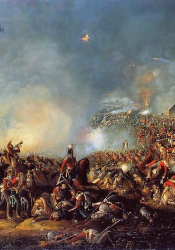Post Napoleonic Depression
Post Napoleonic Depression caused distress in several countries including England after the end of the Napoleonic Wars in 1815. The price of food increased due to new Corn Laws that put tariffs and restrictions on imported food. Due to the high supply of food and low demand, wages began to fall. New machinery was placed in the work environment, taking the places of many working men. (Innes) With no work, money, or food, nearly 60,000 people gathered together in order to protest the end of the suffrage on August 16,1819. In order to gain control of the protest, the local cavalry charged into the crowd killing a dozen people and injuring around 600. This is known as the Peterloo Massacre.(BRANCH) The Post Napoleonic Depression caused social unrest between the people and the parliament. Low wages and high cost of living lead to people doing any kind of work, for example, body snatching. The context of the Post Napoleonic Depression explains the reasoning why body snatching was a common job in the 1800s even when it is unethical. Men needed money to provide for their family and survive, and doctors would pay them well.
Works Cited:
Innes, Ad. A History of British Nation. London, TC and EC Jack, 1912.
“Peterloo Massacre | BRANCH.” Branch, www.branchcollective.org/?ps_event=peterloo-massacre. Accessed 17 Nov. 2021.

